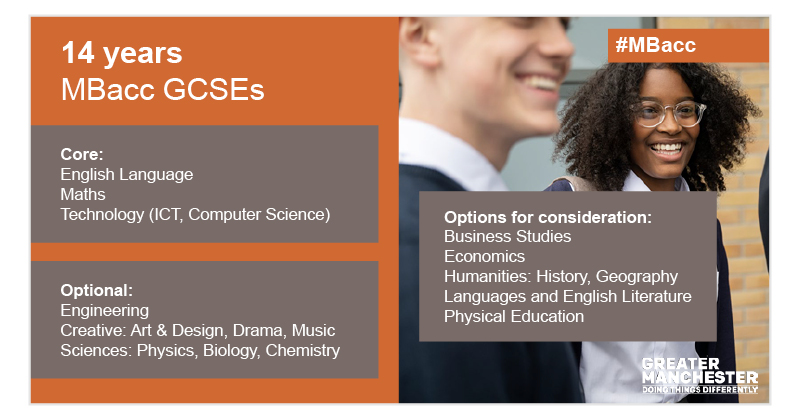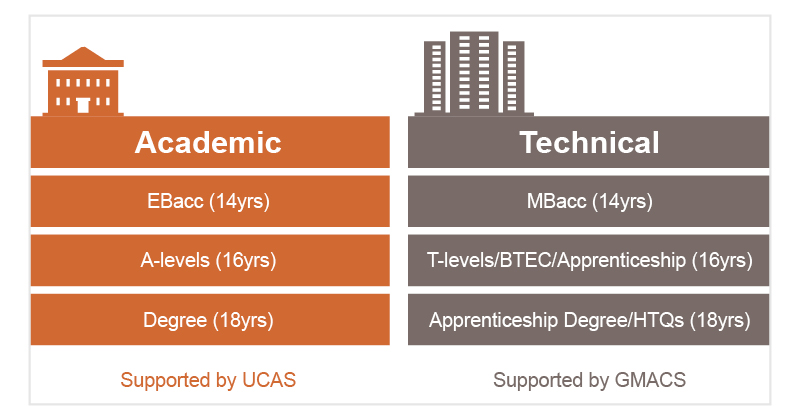Andy Burnham has launched proposals for a “Greater Manchester Baccalaureate” to promote technical education courses to the city region’s young people.
Set to be up and running for year 9 options in 2024, the MBacc will be a list of qualifications that steer pupils towards technical training routes leading to in-demand jobs in the local economy.
The MBacc proposals have put the mayor of Greater Manchester on a collision course with Department for Education ministers, who have fiercely resisted calls to expand EBacc subjects to include creative or technical subjects.
But, unlike the EBacc, there are currently no plans to publish league table measures on entries and achievements on the MBacc subjects, raising questions over how the mayor will incentivise schools to offer more technical options to 14- to 16-year-olds.
Ministers are also set on delivering a Conservative party manifesto “ambition” to see 90 per cent of pupils studying EBacc subjects by 2025.
But the Greater Manchester Combined Authority said that only 36 per cent of 16-year-olds in the area leave compulsory education with EBacc subjects, prompting Burnham to create his alternative.
“The question we’ve all got to consider is what about the 64 per cent? Are we doing enough to help those thousands of young people across Greater Manchester to find their way in life and find their way to all the good jobs that are here. I don’t think we are,” Burnham said at the launch event for his plans on Wednesday.
What is the MBacc?
Like the EBacc, the MBacc is not a qualification in itself. Burnham’s baccalaureate would include a core set of GCSEs in English language, maths and a technology subject such as ICT or computer science.
Alongside those would be options including a GCSE in engineering, creative subjects and the sciences. In addition, the mayor is consulting on including GCSEs in business, economics, humanities, languages and physical education.

With those MBacc GCSEs in the bag, the idea is that 16-year-olds will progress to one of seven “career gateways”, each leading to a T-level or other level 3 qualification, like BTECs in certain subjects.
Then, at 18, MBacc holders would access employment, a degree apprenticeship or a higher technical qualification (HTQ).
The final set of MBacc subjects will be subject to consultation with government and local partners.
No plans for new league tables
Published school performance measures include data on how many pupils are entered for EBacc subjects at GCSE and what grades they achieve.
The DfE also incentivises schools towards EBacc subjects by shutting out heads from schools with low take-up from opportunities to advise on policy and take part in certain government schemes.
Sister title FE Week asked Burnham whether he would be introducing similar incentives, like league tables, to encourage schools towards MBacc subjects.

“I’m not going to be in a position to change those things. I’m not seeking to. The Ebacc is important,” Burnham said.
“We’ll have to have a conversation with the DfE. None of this is confrontational. This is about making some of their policies work better.
“Let’s go on this journey and see if we can help knock T-levels into shape.”
‘New powers’ make MBacc possible
Since becoming the first elected metro mayor of Greater Manchester, Burnham has called for more control over post-technical education.
He describes the MBacc as “the first step on the journey” for Greater Manchester to become “the UK’s first technical education city-region”.
This week’s announcement comes months after Greater Manchester and the West Midlands gained extra skills powers in the Spring Statement.
The pair won the ability to form “joint governance boards” between their combined authorities and the DfE to “provide oversight of post-16 technical education and skills” and become “central convenors” for careers provision in their regions.
Burnham said it was the new board with DfE help that makes his academic and technical pathway options possible.
“What you are hearing today is our first sort of ‘starter for ten’. To say, look, this is what we would want to get to, through this joint board, those two clear equal paths.”
‘What about everybody else?’
James Eldon, principal of Manchester Academy, who already runs an MBacc scheme said it came out of thinking about what his school did for pupils who did not want to study the EBacc.
While future options for EBacc students were “clear and delineated”, which he said as going A-levels and going to university, the route was less clear for other pupils until T-levels came in.
He said technical education now has a “reputation and esteem that’s valuable”.
Addressing concerns the plans are a form of “soft selection” at age 14, meaning children from less advantaged families are pushed to a path that shuts the door on university, Burnham said there was “zero selection about giving [the 64 per cent] stronger, clearer paths”.
















With the world moving into a digital era, it is essential that all students leave school with a level of digital literacy equal to that of English literacy. Education has always used the STEM acronym but when it comes to KS4 onwards that seems to disappear. I am a teacher at a secondary school and am lucky enough that the SLT recognise the need to provide both academic and vocational qualifications.